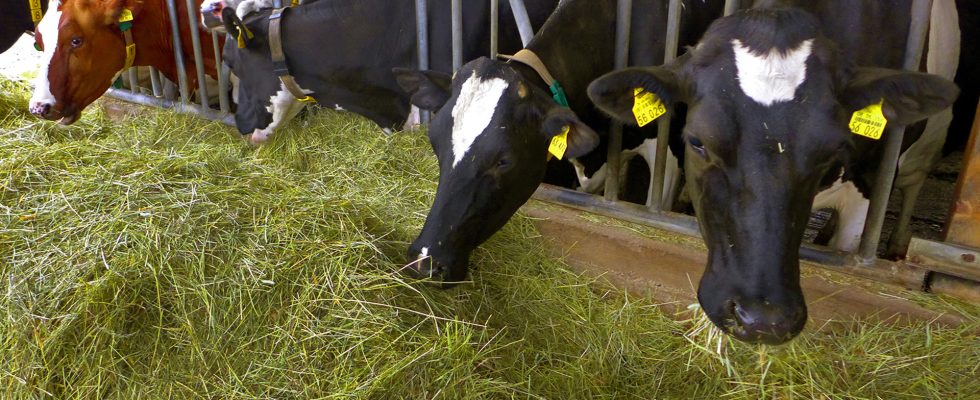Exclusive
Status: 03.04.2023 5:00 a.m
How much space does a dairy cow need? Should she have access to a pasture? So far, there are no legal minimum requirements for keeping the animals. A legal opinion commissioned by Greenpeace sees a need for reform.
Cows grazing in front of a breathtaking mountain backdrop, a bright blue sky – this is how the life of cows is often portrayed on milk packaging or in advertising. The reality is different. According to the Federal Ministry of Agriculture, only about every third cow has access to pasture in summer. The majority of cows live in loose housing under very different conditions.
So far, there are no specific legislator requirements for the appropriate accommodation of cattle older than six months. “That’s amazing when you consider that there are over 50,000 dairy farms in Germany,” says Martin Hofstetter, an agricultural expert at the environmental protection organization Greenpeace. And if you take a closer look at dairy farming, according to the animal and environment lobbyist, the conditions are sometimes frightening.
Greenpeace has therefore commissioned a legal opinion that examines dairy farming more closely and BR research present. The more than 40-page paper identifies deficits in animal welfare. According to the report, written by a well-known Hamburg law firm, a practice has become established that raises concerns about animal welfare.
Tethered in the stable for a lifetime
An example is the so-called tethering. The animals are fixed at the neck with a chain, for example, and stand next to each other in the stable. It is possible to lie down and stand up, but the cow cannot take a few steps forward or back. According to the Federal Statistical Office, ten percent of cattle in Germany live in tethered housing.
According to the Federal Ministry of Agriculture, only about every third cow has access to pasture in summer.
Image: picture alliance/dpa/dpa-Zentral
According to the report, tethering can in individual cases constitute a criminal offense of animal cruelty, but in any case violates key requirements of the Animal Welfare Act. “With this form of husbandry, the basic needs of the cattle are severely restricted,” says Davina Bruhn, a lawyer for animal welfare law, who co-wrote the legal opinion. “In principle, this is an attitude that was never really allowed by the legislature,” explains the lawyer. In practice, however, it has been established for decades.
“Tethering illegal and punishable”
Never explicitly allowed and also not forbidden – what are the legal consequences? “If we assume – which is the state of the art in behavioral research and veterinary medicine – that the animals suffer from being tethered, then we are not moving in a gray area,” says legal expert Jens Bülte. The professor of criminal law at the University of Mannheim assumes that permanent tethering violates the Animal Welfare Act and is therefore illegal and punishable.
The Münster Administrative Court also ruled in this vein in December 2019. An animal protection authority had ordered a livestock owner to allow his cattle to run around for at least two hours a day in summer.
The farmer’s lawsuit was dismissed. The court justified its decision with the severely restricted basic needs of the animals due to tethering. Furthermore, due to the lack of exercise, illnesses and pain can increase, according to the verdict.
Federal government wants to regulate cattle farming
The federal government has set itself the task of solving the problem of tethering. The coalition agreement states that they want to close the gaps in the livestock husbandry ordinance and end tethering in ten years at the latest.
A transition period of ten years is completely wrong, says the lawyer Bruhn. In order to create animal welfare-friendly conditions in cattle husbandry, the legislature must immediately ban tethering and create rules for other forms of husbandry, according to the legal opinion.
Bavaria: 10,000 companies tie up animals all year round
In southern Germany in particular, farmers keep their animals tethered. In Bavaria there are around 10,000 farms where the animals are tied up all year round, according to a 2020 agricultural census.
The Bavarian Ministry of Agriculture writes down BR-Request that a fundamental ban on tethered housing, which includes combined housing, was categorically rejected from the Bavarian point of view. The aim is to provide advice and financial support to farms when switching to loose housing or a combination of tethered housing and grazing.
Year-round tethering appropriate to the species according to the farmers’ association
The Bavarian Farmers’ Association also speaks up BR-Request against a general ban on year-round tethering, but at the same time supports further development and alternatives. When asked whether this form of husbandry is appropriate to the species, the milk president Peter Köninger replies: “According to the five freedoms for assessing the well-being of animals, a cow in tethered housing is free from hunger, protected and experiences no pain, no fear and no mental suffering”. It is said that every animal owner wants their animals to be well.
Legal opinion also on pig farming
The legal opinion calls on the legislator to ensure clarity and to set national minimum requirements for dairy farming. Greenpeace had already caused a stir with a legal opinion in 2017.
The report at the time dealt with conventional pig farming and the question of whether this was compatible with the Animal Welfare Act. This was followed by a judicial review action, which the Federal Constitutional Court intends to decide before the end of this year.

